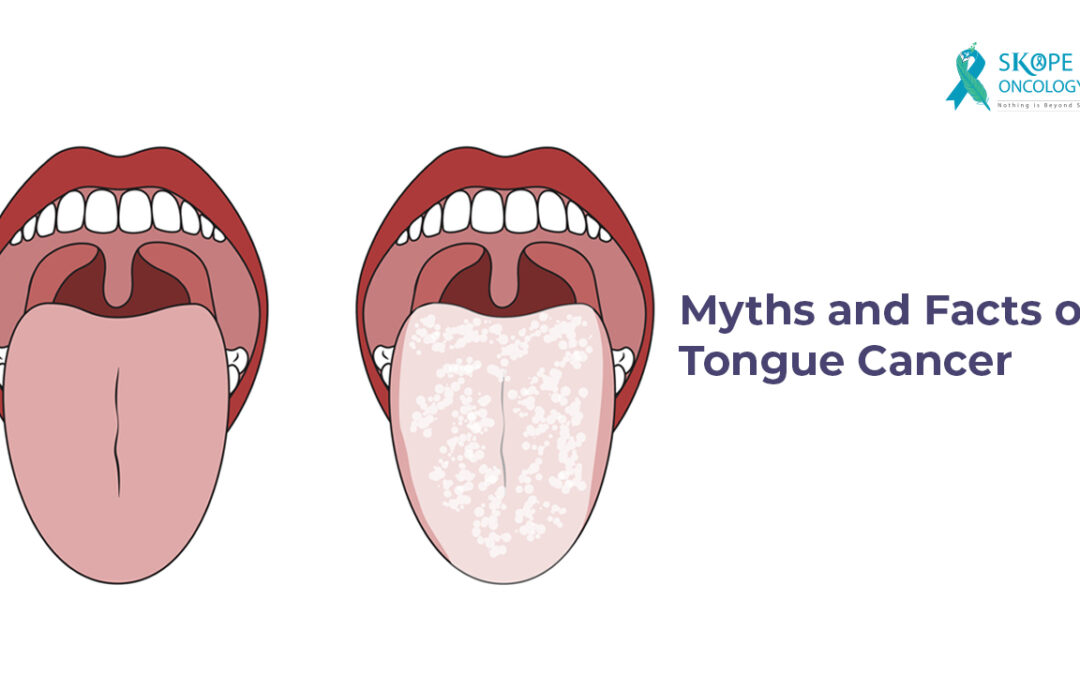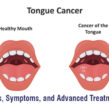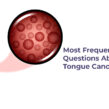Oral cancer, often known as head and neck cancer, is one of the most fatal diseases. Smoking tobacco and other related substances are said to be one of the leading causes of mouth cancer. Various symptoms that we all encounter, when misdiagnosed, might mislead us, causing us to be unaware of the disease. As a result, it is imperative that we be aware of the common misconceptions concerning the disease.
Here are four myths about tongue cancer and the relevant facts to clear them up:
Myth #1: Those who don’t smoke or use tobacco are not at risk of developing tongue cancer
Fact: While it is true that smoking raises your chances of developing tongue cancer, it is not the only possible cause.
Other causes of tongue cancer may include:
- Chronic Irritation by sharp tooth.
- Human Papillomavirus (HPV) Infection
- Excessive alcohol consumption
- Weakened immune system
- Lichen planus (a skin condition that causes small, shiny, reddish bumps)
Fanconi anemia and Dyskeratosis congenita (rare, genetic conditions that affect the bone marrow)
Myth #2: Tongue cancer does not affect young people
Fact: Oral cavity and oropharyngeal cancers typically develop over many years, hence they are uncommon in young people. However, this does not rule out the possibility of cancer in the younger population.
Signs of tongue cancer may include:
- Non-healing ulcer over the tongue for more than 3 weeks.
- Persistent red or white patches on the tongue
- Persistent numbness and soreness in the mouth and throat
- Pain during swallowing
- Burning sensation of the tongue
- A lump in the neck
- Unexplained bleeding from the tongue
If you have any of the symptoms listed above, or if you have a higher risk of developing tongue cancer owing to one or more risk factors, you should see your doctor and have regular dental check-ups.
Myth #3: Tongue cancer does not recur after it has been treated
Fact: If you have had any type of oral cancer, you are at a higher chance of getting another.
That is why you must stay cautious even after you have been cured. A six-monthly check-up with your doctor is highly recommended.
Other signs of oral cancer to look for include:
- A sore that won’t go away. Most minor cuts and scrapes in the mouth heal on their own after a few weeks, but if one does not, see a doctor.
- A lump or a bulge, especially if it is growing in size.
- A red or white patch that bleeds when you touch it.
- The presence of loose teeth is often an indication of gum cancer.
- Speaking, chewing, or swallowing difficulties: Once a tumor has grown large enough, it may be painful to eat or speak, or you may not be able to move your tongue well enough to chew or swallow.
- Weight loss: Chewing and swallowing difficulties are commonly the causes of unexpected weight loss.
Myth #4: If the symptoms are painless, they are not a cause for concern
Fact: Since cancer is not usually painful at early stages and does not heal spontaneously, a sore that does not hurt and does not heal within a few weeks is definitely a cause of concern.
One of the most common symptoms of oral cancer is leukoplakia, the presence of white spots in the mouth. It is a precancerous lesion, indicating an increased risk of developing oral cancer.
There are other signs and symptoms of tongue cancer that may not cause significant pain but should be discussed with your physician if they do not heal on their own.
In most cases, sore tongue and other tongue cancer symptoms are caused by less serious conditions other than cancer. However, any unusual tongue pain or other changes should be closely monitored, and the symptoms should be reported to a physician as soon as possible.
References:
- https://johnfornettidentalcenter.com/shares/oral-cancer-myths-and-facts/
- https://www.onlymyhealth.com/fourteen-myths-and-facts-about-oral-cancer-1619161614
- https://www.mdanderson.org/cancerwise/4-myths-about-oral-cancer-symptoms.h00-159457689.html
- https://www.eehealth.org/blog/2020/02/oral-cancer/
- https://moffitt.org/cancers/oral-cavity-or-throat-cancer/faqs/what-are-the-first-signs-of-tongue-cancer/
- https://www.mskcc.org/cancer-care/types/mouth/mouth-cancer-risk-factors-prevention





